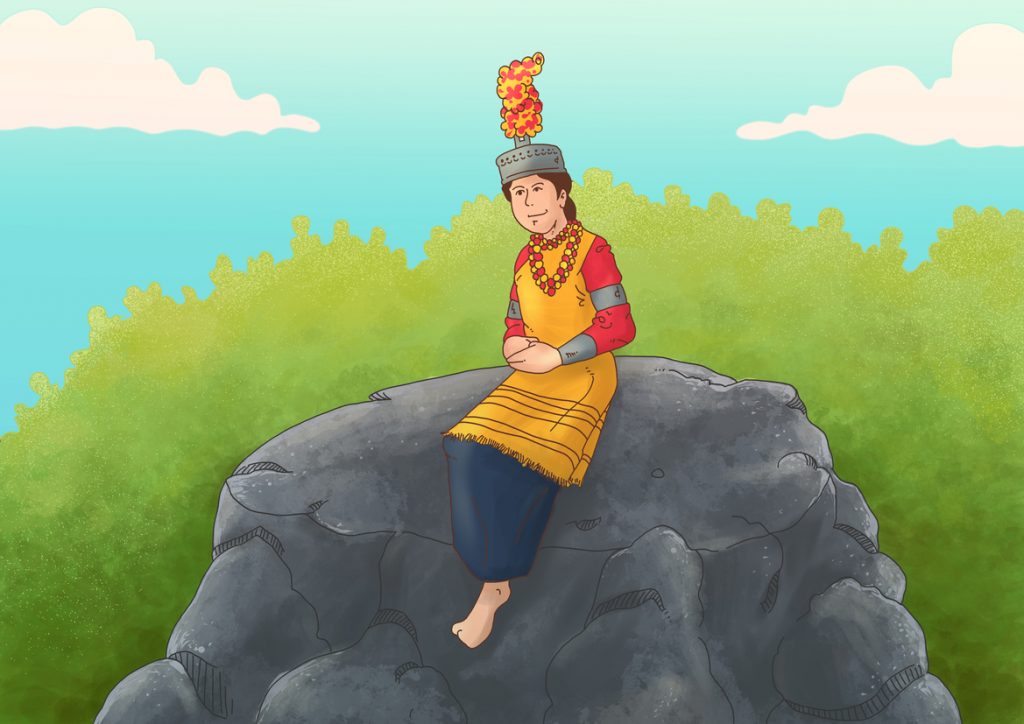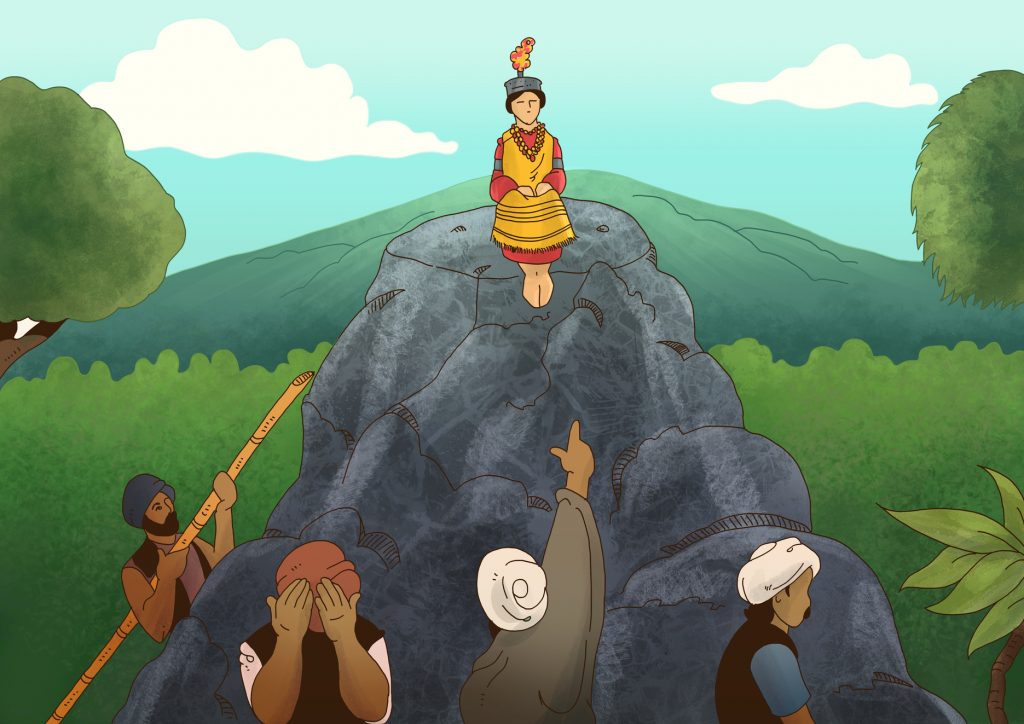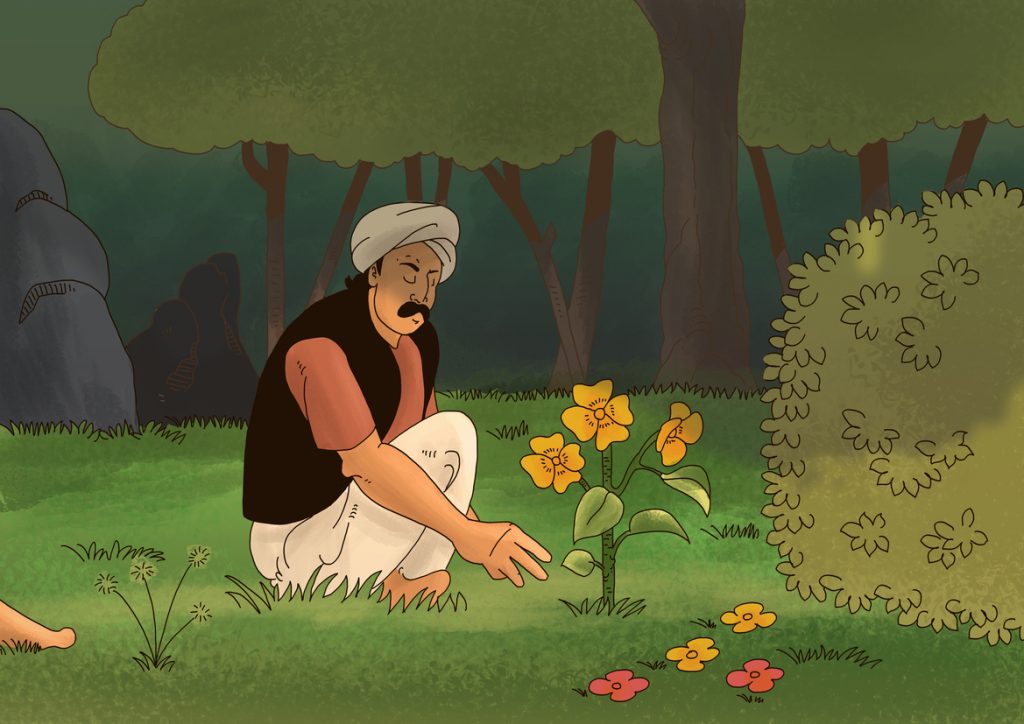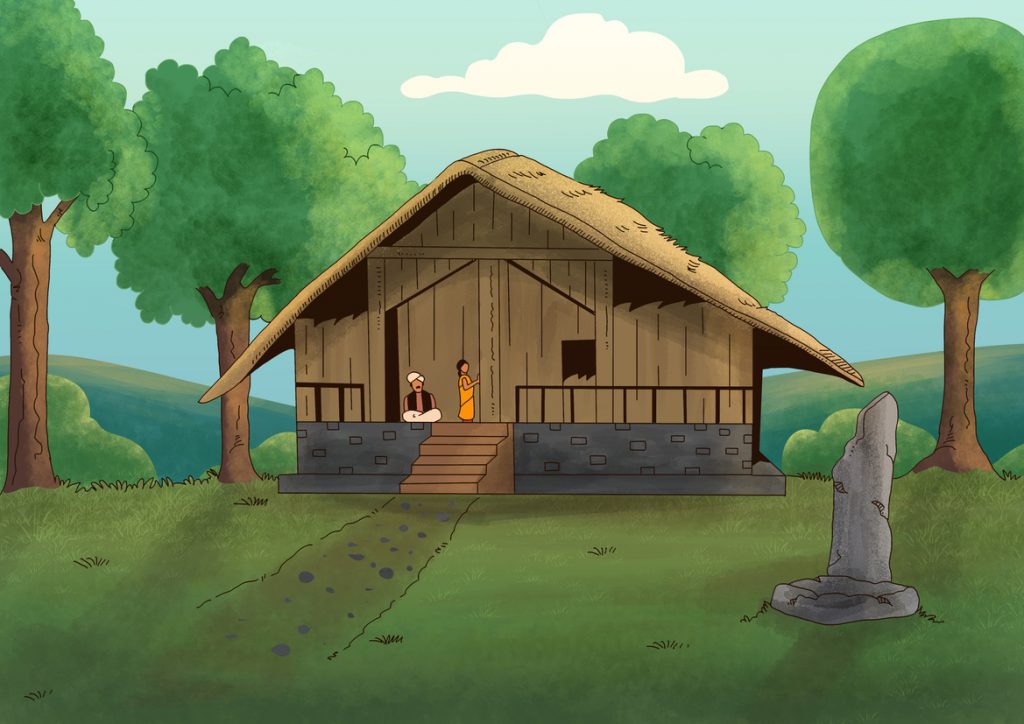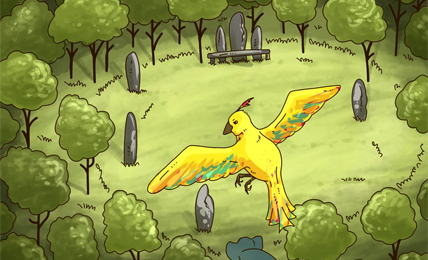
Illustrations: Dr Bhogtoram Mawroh
In the happy olden days, when the animals lived together at peace in the forest, they used to hold fairs and markets after the manner of mankind. The most important fair of all was called “Ka Iew Luri Lura”(the Fair of Luri Lura), which was held at stated intervals in the Bhoi (forest) country. Thither gathered all the animals, each one bringing some article of merchandise, according to the decree which demanded that every animal that came to the fair should bring something to sell. No matter whether he was young or old, rich or poor, no one was to come empty-handed, for they wanted to enhance the popularity of the market. U Khla, the tiger, was appointed governor of the fair.
Man was excluded from these fairs as he was looked upon as an enemy. He used to hunt the animals with his bow and arrows, so they had ceased to fraternise with him and kept out of his way. But one day the dog left his own kindred in the jungle, and became the attendant of Man. The following story tells how that came to pass.
One day U Ksew, the dog, walked abroad in search of goods to sell at the fair. The other animals were thrifty and industrious, they worked to produce their merchandise, but the dog, being of an indolent nature, did not like to work, though he was very desirous to go to the fair. So, to avoid the censure of his neighbours and the punishment of the governor of the fair, he set out in search of something he could get without much labour to himself. He trudged about the country all day, inquiring at many villages, but when evening-time came he had not succeeded in purchasing any suitable goods, and he began to fear that he would have to forgo the pleasure of attending the fair after all.
Just as the sun was setting he found himself on the outskirts of Saddew village, on the slopes of the Shillong Mountain, and as he sniffed the air he became aware of a strong and peculiar odour, which he guessed came from some cooked food. Being hungry after his long tramp, he pushed his way forward, following the scent till he came to a house right in the middle of the village, where he saw the family at dinner, which he noticed they were eating with evident relish. The dinner consisted of fermented Khasi beans, known as ktung rymbai, from which the strong smell emanated.
The Khasis are naturally a very cordial and hospitable people, and when the good wife of the house saw the dog standing outside looking wistfully at them she invited him to partake of what food there was left in the pot. U Ksew thankfully accepted, and by reason of his great hunger he ate heartily, regardless of the strange flavour and smell of the food, and he considered the ktung rymbai very palatable.
It dawned on him that here, quite by accident, he had found a novel and marketable produce to take to the fair; and it happened that the kindly family who had entertained him had a quantity of the stuff for sale which they kept in earthen jars, sealed with clay to retain its flavour. After a little palaver according to custom, a bargain was struck, and U Ksew became the owner of one good-sized jar of ktung rymbai, which he cheerfully took on his back. He made his way across the hills to Luri Lura fair, chuckling to himself as he anticipated the sensation he would create and the profits he would gain, and the praise he would win for being so enterprising.
On the way he encountered many of the animals who like himself were all going to Luri Lura, and carrying merchandise on their backs to sell at the fair: to them U Ksew boasted of the wonderful food he had discovered and was bringing with him to the market in the earthen jar under the clay seal. He talked so much about it that the contents of the earthen jar became the general topic of conversation between the animals, for never had such an article been known at Luri Lura.
When he arrived at the fair the dog walked in with great consequence, and installed himself and his earthen jar in the most central place with much clatter and ostentation. Then he began to shout at the top of his voice, “Come and buy my good food, ”and what with his boastings on the road and the noise he made at the fair, a very large company gathered round him, stretching their necks to have a glimpse at the strange-looking jar, and burning with curiosity to see the much-advertised contents.
U Ksew, with great importance, proceeded to uncover the jar; but as soon as he broke the clay seal a puff of the most unsavoury and fœtid odour issued forth and drove all the animals scrambling to a safe distance, much to the dog’s discomfiture and the merriment of the crowd. They hooted and jeered, and made all sorts of disparaging remarks till U Ksew felt himself covered with shame.
The stag pushed forward, and to show his disdain he contemptuously kicked the earthen jar till it broke. This increased the laughter and the jeering, and more of the animals came forward, and they began to trample the ktung rymbai in the mud, taking no notice of the protestations of U Ksew, who felt himself very unjustly treated.
He went to U Khla, the governor of the fair, to ask for redress, but here again he was met with ridicule and scorn, and told that he deserved all the treatment he had received for filling the market-place with such a stench.
At last U Ksew’s patience wore out, he grew snappish and angry, and with loud barks and snarls he began to curse the animals with many curses, threatening to be avenged upon them all some day. At the time no one heeded his curses and threats, for the dog was but a contemptible animal in their estimation, and it was not thought possible for him to work much harm. Yet even on that day a part of his curse came true, for the animals found to their dismay that the smell of the ktung rymbai clung to their paws and their hoofs, and could not be obliterated; so the laughter was not all on their side.
Humiliated and angry, the dog determined to leave the fair and the forest and his own tribe, and to seek more congenial surroundings; so he went away from Luri Lura, never to return, and came once more to Saddew village, to the house of the family from whom he had bought the offending food. When the master of the house heard the story of the ill-treatment he had suffered from the animals, he pitied U Ksew, and he also considered that the insults touched himself as well as the dog, inasmuch as it was he who had prepared and sold the ktung rymbai. So he spoke consolingly to U Ksew and patted his head and told him to remain in the village with him, and that he would protect him and help him to avenge his wrongs upon the animals.
After the coming of the dog, Man became a very successful hunter, for the dog, who always accompanied him when he went out to hunt, was able to follow the trail of the animals by the smell of the ktung rymbai, which adhered to their feet. Thus the animals lived to rue the day when they played their foolish pranks on U Ksew and his earthen jar at the fair of Luri Lura.
Man, having other occupations, could not always go abroad to the jungle to hunt; so in order to secure a supply of meat for himself during the non-hunting seasons he tamed pigs and kept them at hand in the village. When the dog came he shared the dwelling and the meals of the pig, U Sniang; they spent their days in idleness, living on the bounty of Man.
One evening, as Man was returning from his field, tired with the day’s toil, he noticed the two idle animals and he said to himself—“It is very foolish of me to do all the hard work myself while these two well-fed creatures are lying idle. They ought to take a turn at doing some work for their food.”
The following morning Man commanded the two animals to go to the field to plough in his stead. When they arrived there U Sniang, in obedience to his master’s orders, began to dig with his snout, and by nightfall had managed to furrow quite a large patch of the field; but U Ksew, according to his indolent habits, did no work at all. He lay in the shade all day, or amused himself by snapping at the flies. In the evening, when it was time to go home, he would start running backwards and forwards over the furrows, much to the annoyance of the pig.
The same thing happened for many days in succession, till the patience of the pig was exhausted, and on their return from the field one evening he went and informed their master of the conduct of the dog, how he was idling the whole day and leaving all the work for him to do.
The master was loth to believe these charges against U Ksew, whom he had found such an active and willing helper in the chase: he therefore determined to go and examine the field. When he came there he found only a few of the footprints of the pig, while those of the dog were all over the furrows. He at once concluded that U Sniang had falsely charged his friend, and he was exceedingly wroth with him.
When he came home, Man called the two animals to him, and he spoke very angrily to U Sniang, and told him that henceforth he would have to live in a little sty by himself, and to eat only the refuse from Man’s table and other common food, as a punishment for making false charges against his friend; but the dog would be privileged to live in the house with his master, and to share the food of his master’s family.
Thus it was that the dog came to live with Man.
Bhogtoram Mawroh is a freelance Cartoonist and Artist. He works as Senior Associate, Research and Knowledge Management at North East Slow Food and Agrobiodiversity Society
Man was excluded from these fairs as he was looked upon as an enemy. He used to hunt the animals with his bow and arrows, so they had ceased to fraternise with him and kept out of his way. But one day the dog left his own kindred in the jungle, and became the attendant of Man. The following story tells how that came to pass.
One day U Ksew, the dog, walked abroad in search of goods to sell at the fair. The other animals were thrifty and industrious, they worked to produce their merchandise, but the dog, being of an indolent nature, did not like to work, though he was very desirous to go to the fair. So, to avoid the censure of his neighbours and the punishment of the governor of the fair, he set out in search of something he could get without much labour to himself. He trudged about the country all day,
inquiring at many villages, but when evening-time came he had not succeeded in purchasing any suitable goods, and he began to fear that he would have to forgo the pleasure of attending the fair after all.
Just as the sun was setting he found himself on the outskirts of Saddew village, on the slopes of the Shillong Mountain, and as he sniffed the air he became aware of a strong and peculiar odour, which he guessed came from some cooked food. Being hungry after his long tramp, he pushed his way forward, following the scent till he came to a house right in the middle of the village, where he saw the family at dinner, which he noticed they were eating with evident relish. The dinner consisted of fermented Khasi beans, known as ktung rymbai, from which the strong smell emanated.
The Khasis are naturally a very cordial and hospitable people, and when the good wife of the house saw the dog standing outside looking
wistfully at them she invited him to partake of what food there was left in the pot. U Ksew thankfully accepted, and by reason of his great hunger he ate heartily, regardless of the strange flavour and smell of the food, and he considered the ktung rymbai very palatable.
It dawned on him that here, quite by accident, he had found a novel and marketable produce to take to the fair; and it happened that the kindly family who had entertained him had a quantity of the stuff for sale which they kept in earthen jars, sealed with clay to retain its flavour. After a little palaver according to custom, a bargain was struck, and U Ksew became the owner of one good-sized jar of ktung rymbai, which he cheerfully took on his back. He made his way across the hills to Luri Lura fair, chuckling to himself as he anticipated the sensation he would create and the profits he would gain, and the praise he would win for being so enterprising.
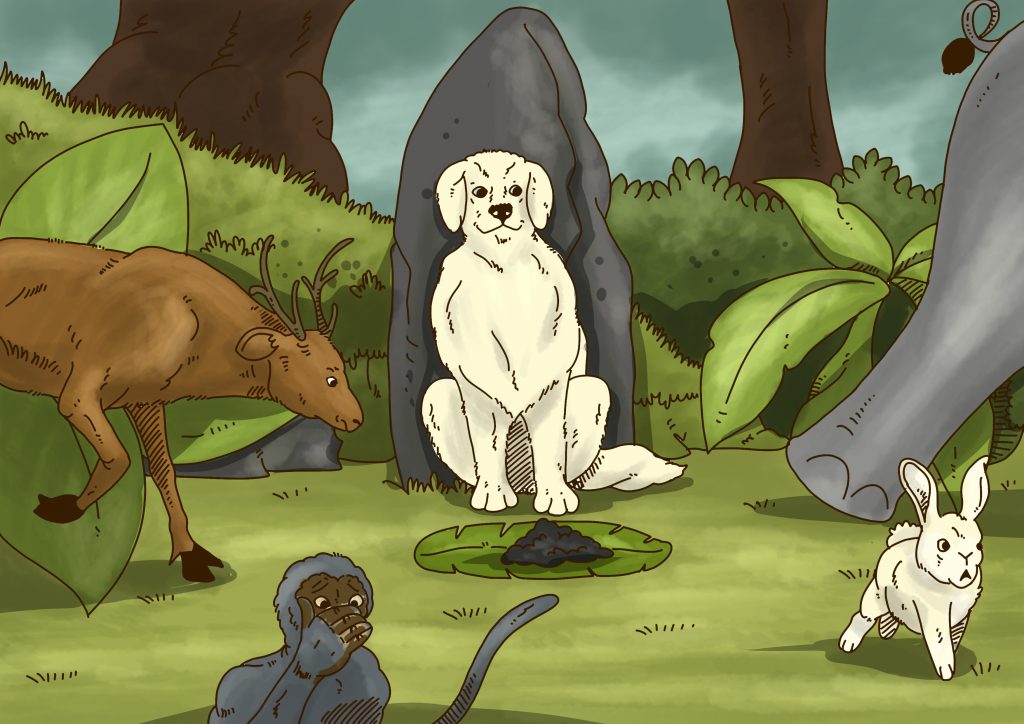
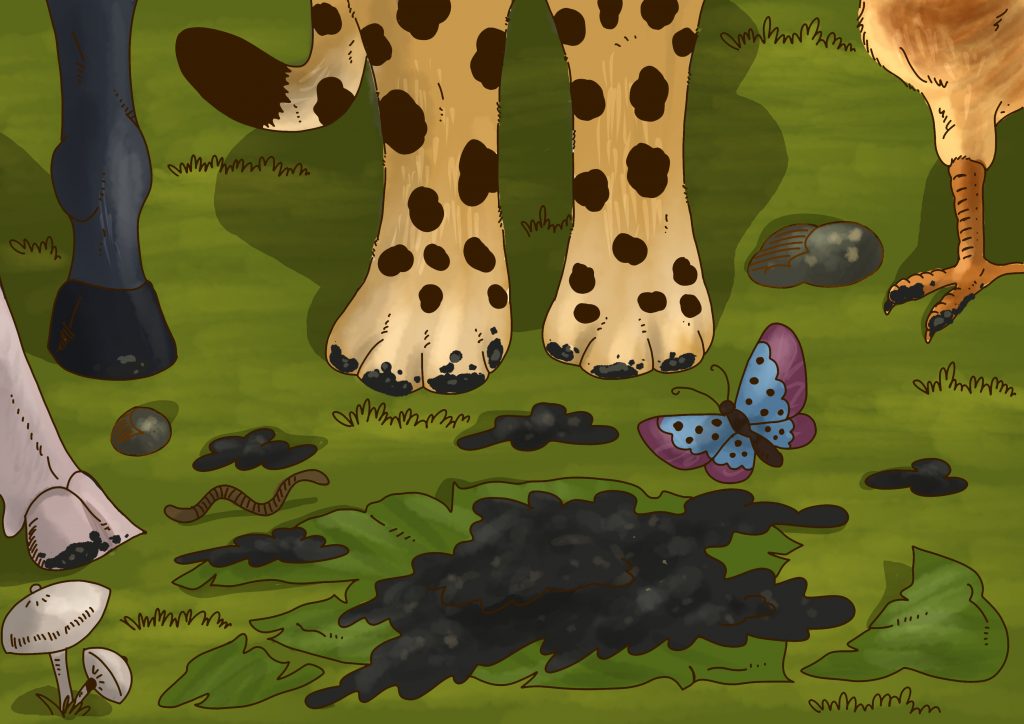
On the way he encountered many of the animals who like himself were all going to Luri Lura, and
carrying merchandise on their backs to sell at the fair: to them U Ksew boasted of the wonderful food he had discovered and was bringing with him to the market in the earthen jar under the clay seal. He talked so much about it that the contents of the earthen jar became the general topic of conversation between the animals, for never had such an article been known at Luri Lura.
When he arrived at the fair the dog walked in with great consequence, and installed himself and his earthen jar in the most central place with much clatter and ostentation. Then he began to shout at the top of his voice, “Come and buy my good food, ”and what with his boastings on the road and the noise he made at the fair, a very large company gathered round him, stretching their necks to have
a glimpse at the strange-looking jar, and burning with curiosity to see the much-advertised contents.
U Ksew, with great importance, proceeded to uncover the jar; but as soon as he broke the clay seal a puff of the most unsavoury and fœtid odour issued forth and drove all the animals scrambling to a safe distance, much to the dog’s discomfiture and the merriment of the crowd. They hooted and jeered, and made all sorts of disparaging remarks till U Ksew felt himself covered with shame.
The stag pushed forward, and to show his disdain he contemptuously kicked the earthen jar till it broke. This increased the laughter and the jeering, and more of the animals came forward, and they began to trample the ktung rymbai in the mud, taking no notice of the protestations of U Ksew, who felt himself very unjustly treated.
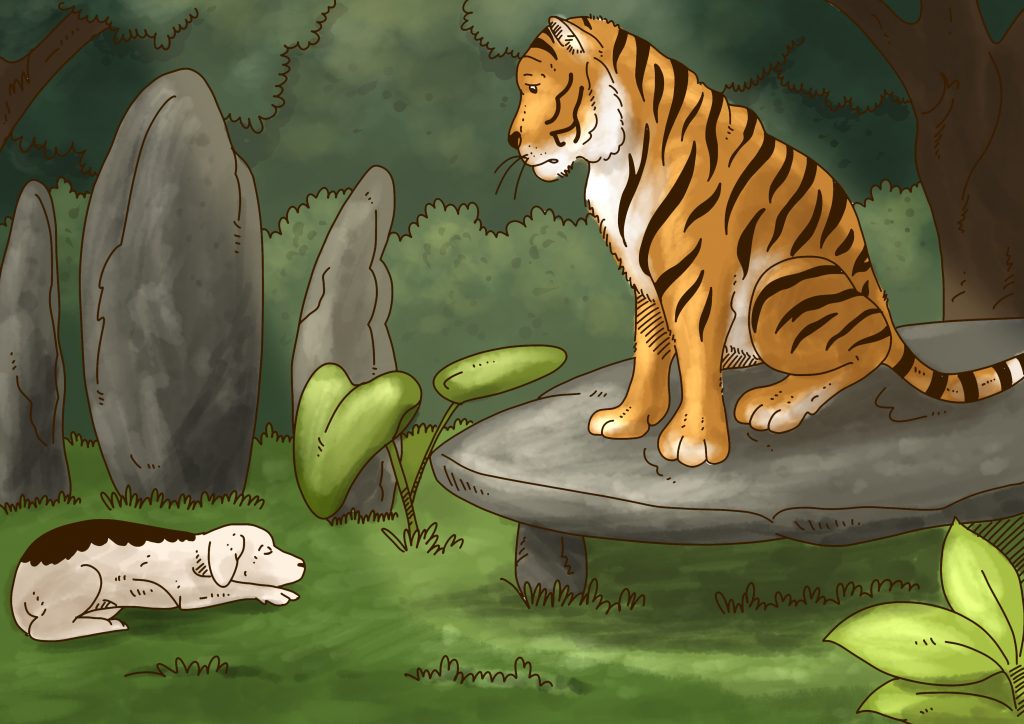
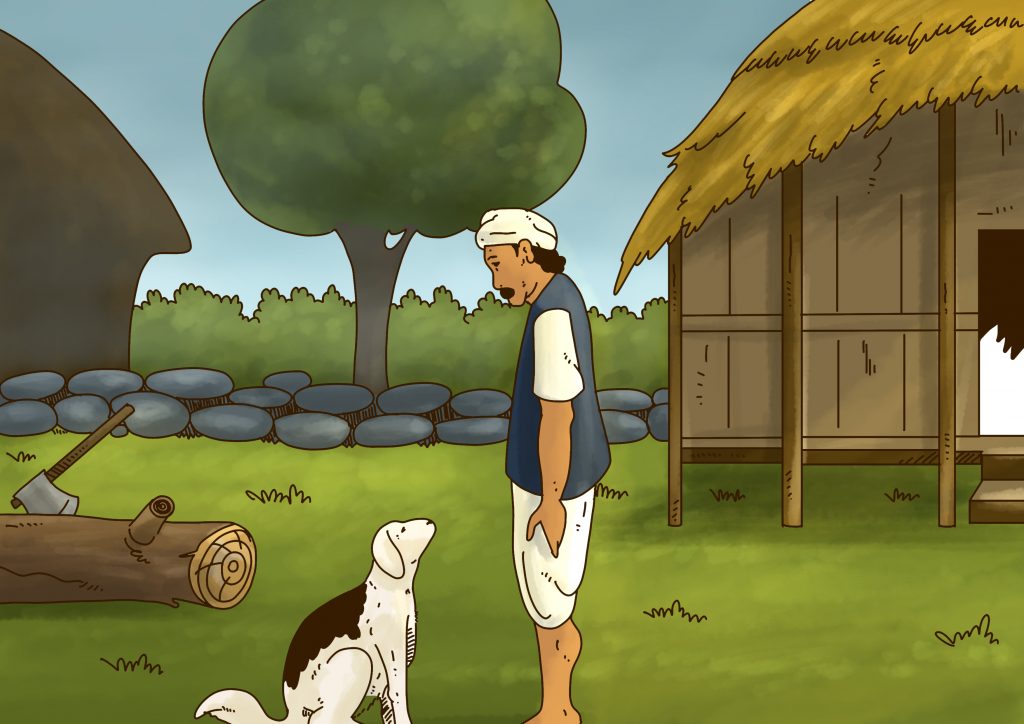
He went to U Khla, the governor of the fair, to ask for redress, but here again he was met with ridicule and scorn, and told that he deserved all the treatment he had received for filling the market.
At last U Ksew’s patience wore out, he grew snappish and angry, and with loud barks and snarls he began to curse the animals with many curses, threatening to be avenged upon them all some day. At the time no one heeded his curses and threats, for the dog was but a contemptible animal in their estimation, and it was not thought possible for him to work much harm. Yet even on that day a part of his curse came true, for the animals found to their dismay that the smell of the ktung rymbai clung to their paws and their hoofs, and could not be obliterated; so the laughter was not all on their side.
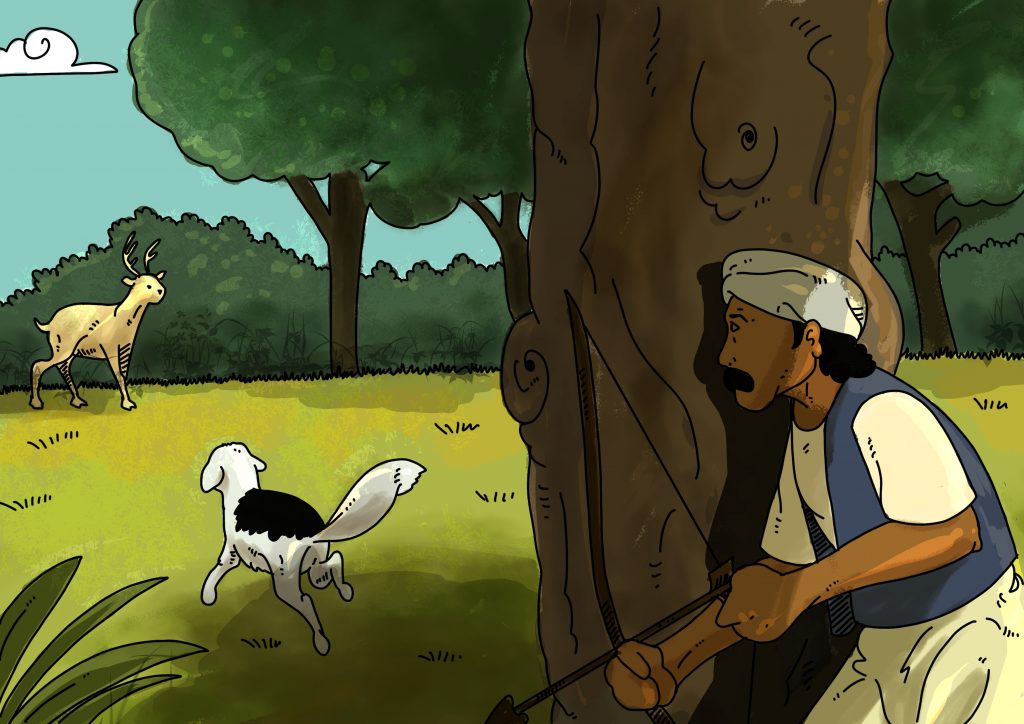
Humiliated and angry, the dog determined to leave the fair and the forest and his own tribe, and to seek more congenial surroundings; so he went away from Luri Lura, never to return, and came once more to Saddew village, to the house of the family from whom he had bought the offending food. When the master of the house heard the story of the ill-treatment he had suffered from the animals, he pitied U Ksew, and he also considered that the insults touched himself as well as the dog, inasmuch as it was he who had prepared and sold the ktung rymbai. So he spoke consolingly to U Ksew and patted his head and told him to remain in the village with him, and that he would protect him and help him to avenge his wrongs upon the animals.
After the coming of the dog, Man became a very successful hunter, for the dog, who always accompanied him when he went out to hunt, was able to follow the trail of the animals by the smell of the ktung rymbai, which adhered to their feet. Thus the animals lived to rue the day when they played their foolish pranks on U Ksew and his earthen jar at the fair of Luri Lura.
Man, having other occupations, could not always go abroad to the jungle to hunt; so in order to secure a supply of meat for himself during the non-hunting seasons he tamed pigs and kept them at hand in the village. When the dog came he shared the dwelling and the meals of the pig, U Sniang; they spent their days in idleness, living on the bounty of Man.
One evening, as Man was returning from his field, tired with the day’s toil, he noticed the two idle animals and he said to himself—“It is very foolish of me to do all the hard work myself while these two well-fed creatures are lying idle. They ought to take a turn at doing some work for their food.”
The following morning Man commanded the two animals to go to the field to plough in his stead. When they arrived there U Sniang, in obedience to his master’s orders, began to dig with his snout, and by nightfall had managed to furrow quite a large patch of the field; but U Ksew, according to his indolent habits, did no work at all. He lay in the shade all day, or amused himself by snapping at the
flies. In the evening, when it was time to go home, he would start running backwards and forwards over the furrows, much to the annoyance of the pig.
The same thing happened for many days in succession, till the patience of the pig was exhausted, and on their return from the field one evening he went and informed their master of the conduct of the dog, how he was idling the whole day and leaving all the work for him to do.
The master was loth to believe these charges against U Ksew, whom he had found such an active and willing helper in the chase: he therefore determined to go and examine the field. When he came there he found only a few of the footprints of the pig, while those of the dog were all over the furrows. He at once concluded that U Sniang had falsely charged his friend, and he was exceedingly wroth with him.
When he came home, Man called the two animals to him, and he spoke very angrily to U Sniang, and told him that henceforth he would have to live in a little sty by himself, and to eat only the refuse from Man’s table and other common food, as a punishment for making false charges against his friend; but the dog would be privileged to live in the house with his master, and to share the food of his master’s family.
Thus it was that the dog came to live with Man.
Bhogtoram Mawroh is a freelance Cartoonist and Artist. He works as Senior Associate, Research and Knowledge Management at North East Slow Food and Agrobiodiversity Society.


